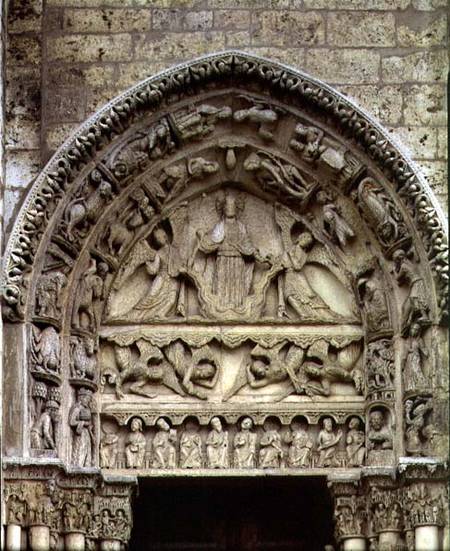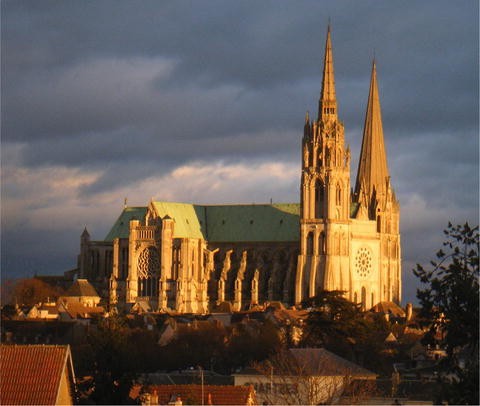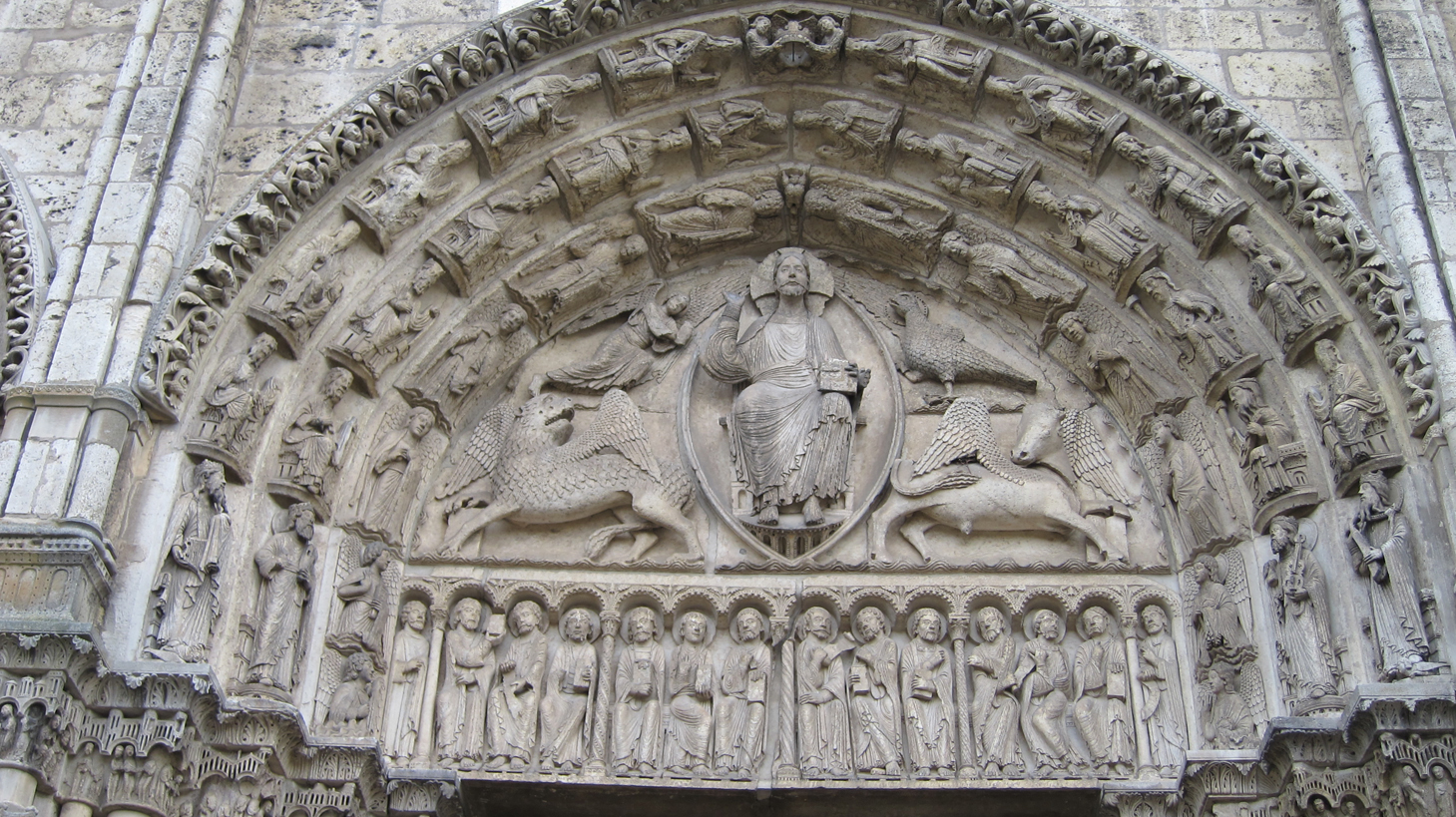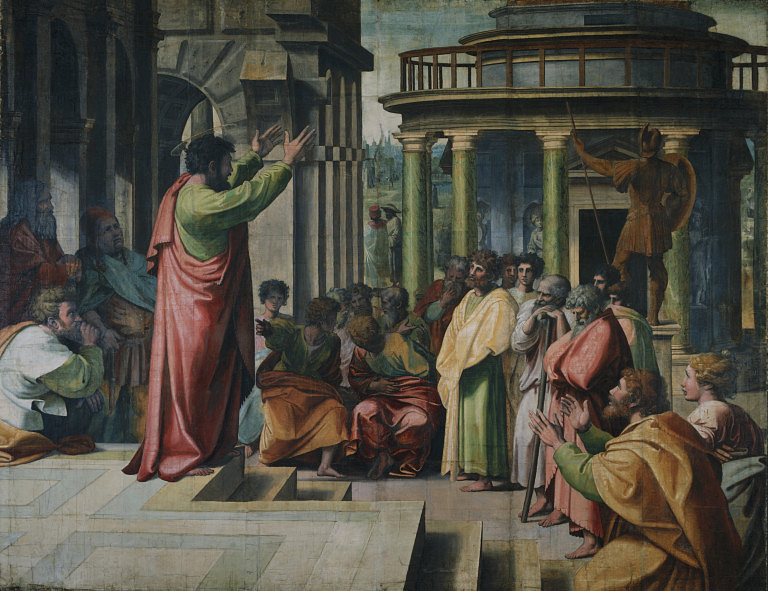
At the centre is Christ--as in the central and south portals--the very subject of the Church's proclamation: "For what we preach is not ourselves, but Jesus Christ as Lord" (2 Cor 4:5). The mandate to preach Christ was bequeathed to the Church in the days leading up to His Ascension: St Matthew the Evangelist shows one moment in the delivery of the Great Commission in Galilee, with the mandate to "Go therefore and make disciples of all nations, baptizing them in the Name of the Father, and of the Son, and of the Holy Spirit, teaching them to observe all that I have commanded you..." (Mt 28:16-20); St Mark the Evangelist shows the Risen Jesus "at table" with the Eleven--apparently at Jerusalem--repeating the same mandate in a slightly different fashion: "Go into all the world and preach the Gospel to the whole creation. He who is baptised will be saved; but he who does not believe will be condemned" (cf Mk 16:14-18). St Luke's version fills in a few more blanks: while his gospel mentions the Ascension, he postpones the Great Commission to the second volume, the Acts of the Apostles; in this case, instead of telling them outright that they ought to preach the Gospel, the Risen Lord simply says that imminent experience of baptism in the Holy Spirit will ignite their worldwide mission:
In the Markan version of the Great Commission, Jesus warned that refusal to heed the Gospel would spell everlasting loss (Mk 16:16). The Lukan version also hints at the eschatological implications of the Gospel proclamation by evoking Zechariah 14:4, "On that day His feet shall stand on the Mount of Olives which lies before Jerusalem on the east." This is why those "two men" who appeared to the Apostles "in white robes" spoke of Jesus' return "in the same way you saw Him go..." Recall, too, Jesus' Olivet Discourse where, among other things, He spoke of the future Judgment (cf Mt 24-25).[Jesus] said to them, "it is not for you to know the times or seasons which the Father has fixed by his own authority. But you shall receive power when the Holy Spirit has come upon you; and you shall be My witnesses in Jerusalem and in all Judea and Samaria and to the end of the earth. And when He had said this, as they were looking on, He was lifted up and a cloud took Him out of their sight. And while they were gazing into heaven as He went, behold, two men stood by them in white robes, and said, "Men of Galilee, why do you stand looking into heaven? This Jesus, who was taken up from you into heaven, will come in the same way as you saw Him go into heaven." (Acts 1:7-11).
It seems to me, then, that--not wholly unlike the tympanum at Vezelay--the north portal is a 'mash-up' of the Ascension and Second Coming. The clouds in the sculpture are reminiscent of Matthew 24:30-31,
Could it be that the two angels beside Christ in the tympanum sculpture are reminiscent of Acts 1:10, and the four angels below Him are reminiscent of those who were to assemble the Elect from the "four winds" in Matthew 1:31?...and they will see the Son of Man coming on the clouds of heaven with power and great glory; and He will send out His angels with a loud trumpet call, and they will gather His elect from the four winds, from one end of heaven to the other (cf Mk 13:26; Lk 21:21).
If that is the case, it would certainly make sense of the meaning of the constellation symbols in the archivolt, showing the months of the year and their respective labours. The cosmic clock will continue to tick, but only until human history has run its course; someone once said that "death is a remedy for sin" because there is an inevitable but unknowable deadline appointed to us. Therefore, as St Paul wrote to his young co-worker St Timothy:
It seems to me, then, that describing the tympanum sculpture as a 'mash-up' of the Ascension and Second Coming is too facile, after all; rather, it illustrates the urgency of mission.I charge you in the presence of God and of Christ Jesus who is to judge the living and the dead, and by His appearing and His Kingdom: Preach the Word, be urgent in season and out of season, convince, rebuke, and exhort, be unfailing in patience and in teaching (2 Tim 4:1-2).
It is only right, then, to ask: How do we account for the Church's missionary lethargy of late? What is especially troubling is that many people, in the name of their Catholicity, want to remedy structural injustices in the world by turning more quickly to social activism than to the Gospel. Sure, they call what they're doing "Gospel" but it is not, because such people rely upon their own moxie and the good will of others to repair a broken world. They are, essentially, self-styled Donatists while being unwittingly Pelagian.
As a Black police officer rightly pointed out, the world's problem is, at its deepest level, one of sin, and no amount of graceless wokeness can remedy that, because to be "woke" is to be in the deepest of slumbers, and to be a woke Christian is to be spiritually comatose. What the world needs is the enlightenment which Christ alone provides:
I will be so bold as to say that for Christians to try to remedy the world with "wokeness" only serve to darken the world further."Awake, O sleeper, and arise from the dead, and Christ will give you light." Look carefully then ow you walk, not as unwise men but as wise, making the most of the time, because the days are evil (Eph 5:14-15).
With her main doors facing the sunset and the Church thus confronting the waning world's darkness, Christianity's urgent mission is to proclaim nothing other than that illumination given by Christ alone.













